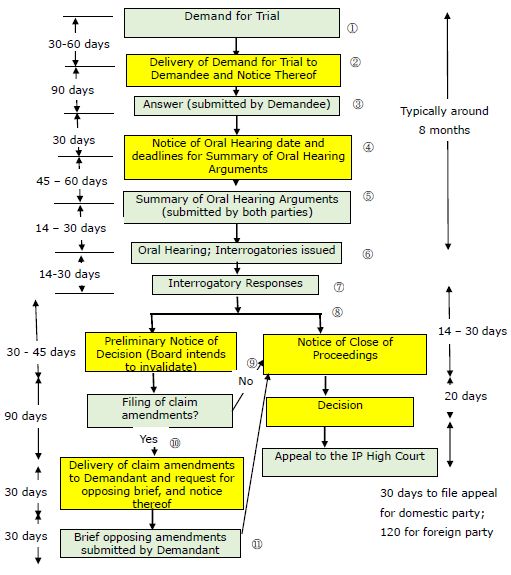- in Asia

![]()
1. This is the Demandant's detailed written allegations listing the reasons for invalidation of the patent in question. The Demandant must identify itself (e.g., no strawman allowed). Following the filing of the Demand for Trial ("Demand") with the JPO, the JPO checks to ensure that all requisite documents have been properly submitted, and a Board of Appeals consisting of 3 appellate examiners is appointed to hear the case. Clerical errors can cause delay in the delivery of the Demand, as the JPO will typically issue a demand for correction of clerical errors where errors are found, and the Demand will not be delivered until all identified errors are corrected.
2. The JPO delivers a copy of the Demand to the Demandee (the patentee) and requests that the Demandee file an Answer to the allegations contained within the Demand. The Demandee may also submit claim amendments within the time limit for filing the Answer.
3. This is the Demandee's detailed written response to the allegations contained in the Demand. The Demandee is typically required to respond within 90 days from the delivery date of the Demand.
4. Following the filing of the Answer, the Appeals Board consults with the parties on available dates for the Oral Hearing. Following this consultation, the Board issues a notice of the date of the Oral Hearing and the date each party's Summary of Oral Hearing briefing is to be submitted.
5. The Summary of Oral Hearing for both parties is envisioned to be a written summary of the arguments that each party is to make at the oral hearing. This often represents the first opportunity for the Demandant to respond to Demandee's arguments made in the Answer. While both parties may be required to file these briefs on the same day (typically a few weeks before the Oral Hearing), some Appeals Boards may require the Demandee to file their Summary of Oral Hearing a few weeks earlier than the Demandant.
6. Both parties make their oral arguments, typically using a multimedia presentation (often a PowerPoint presentation). Any presentation materials typically must be submitted on the day prior to the hearing. While the arguments and evidence must have been made and submitted in the Summary of Oral Hearing, the structure and organization of the oral arguments, and the points emphasized, can communicate the strongest points of a party's case to the Appeals Board. The Appeals Board has discretion as to whether to keep the presentations in evidence as part of the official case file. Members of the Appeals Board may ask questions regarding any aspect of the case to either party during the Oral Hearing. The written record of the Oral Hearing is often quite brief, which means that typically little of what either party states during the hearing is kept as evidence in the case record. However, for important questions, the Appeals Board often issues interrogatories restating question(s)asked during the hearing and requiring the designated party to answer the questions in writing on the record (as in this example).
7. As the interrogatories represent the questions on which the Appeals Board believes further argument could be valuable at this late stage in the case, answering these questions in a satisfactory manner is often important to the final outcome. Please note the Appeals Board may issue interrogatories at other times as well(e.g., following the Answer).
8. After the oral hearing, Appeals Board typically makes a preliminary judgment on whether it intend to invalidate any of the claims of the patent. If it intends to invalidate some or all claims, it must issue a preliminary notice of decision and provide the Demandee with 90 days to submit potential claim amendments. If Appeals Board does not intend to invalidate any claims, it issues a notice of close of proceedings followed within 20 days by a decision to maintain all claims.
9. If the Demandee makes no claim amendments within the 90 day period following the Preliminary Notice of Decision, the Appeals Board will proceed to issue a Notice of Close of Proceedings and issue a decision invalidating some or all claims shortly thereafter.
10. If the Demandee makes claim amendments within the 90 day period following the Preliminary Notice of Decision, it also includes an explanation of the amendments, and optionally includes arguments for their legality and patentability. The Appeals Board may or may not proceed to request additional briefing from the Demandant regarding the legality and patentability of the proposed claim amendments. In this example, the Appeals Board has asked for additional briefing from the Demandant (in other cases the Board may decide on these issues without hearing from the Demandant).
11. The Appeals Board must decide then both on the legality of the amendments and the patentability of the amended claims if the amendments are accepted.
* As most of the time periods provided here are designated by the JPO Appeals Board hearing the case rather than set by law, there can be considerable variation between cases. Furthermore, additional procedures (such as 3rdparties seeking to join the action, additional interrogatories, etc.) may lead to further deviations from this example.
The content of this article is intended to provide a general guide to the subject matter. Specialist advice should be sought about your specific circumstances.
